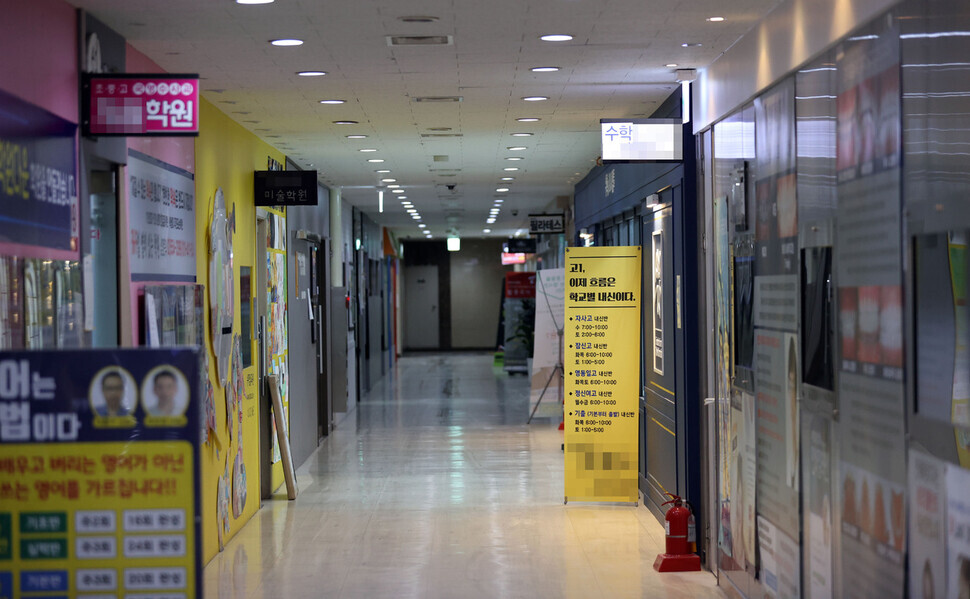hankyoreh
Links to other country sites 다른 나라 사이트 링크
S. Korea’s cumulative case total to pass 20,000 shortly

South Korea reported 248 new cases of COVID-19 on Aug. 31, bringing the cumulative total to the threshold of 20,000. The number of new daily cases dropped fell below 300 over the course of the weekend, but the situation has not yet reached the point where people can rest easy, as cases of unclear transmission continue to surface. Korea Centers for Disease Control and Prevention (KCDC) Director Jung Eun-kyeong stressed, “We need to be swift and intensive about seeing through the Level 2.5 social distancing measures that were implemented this week.”
According to the KCDC, a total of 238 domestic cases and 10 overseas cases were diagnosed on Aug. 30. The cumulative total of confirmed cases stands at 19,947. The daily average caseload for the past two weeks stands at 299.7 -- an eightfold increase from the two weeks before that. Over that two-week period, 40 infection clusters emerged, while the rate of “disease control network management” -- reflecting the proportion of new cases among people who came into contact with previously diagnosed patients -- fell below 80%. Jung said, “It looks like the cumulative case total will pass 20,000 shortly, which is much quicker than we had been planning for.”
Disease control authorities are particularly focused on the proportion of cases where the transmission route is still under investigation, which has climbed to the range of 20%. The number indicates a substantial increase in cases of unknown transmission, showing the risk of “silent spreading” by asymptomatic patients.
Jung explained, “Even where there are asymptomatic or mildly symptomatic patients whom we have been unable to identity, their transmissibility goes away around five days after infection, so we’re intensifying social distancing measures to prevent them from transmitting to many [people] during that time frame.”
“We need to not let our guard down through the rest of this week,” she urged.
Jung also stressed that “we need to be swift and intensive about seeing through the upgraded social distancing regimen to maximize disease control while minimizing [economic] losses.” Disease control authorities are predicting the effects of the “Level 2.5” social distancing measures imposed as of 12 am on Aug. 30 will become apparent as early as the end of this week or the beginning of next week.
As of Aug. 31, the number of cases associated with Sarang Jeil Church in Seoul’s Seongbuk District had risen by 21 to a total of 1,056, while the number associated with a Liberation Day demonstration in Seoul’s Gwanghwamun Square on Aug. 15 had risen by 30 to 399. The KCDC renewed its calls for church members and rally participants to get tested.
“While the incubation period of roughly two weeks has passed, we cannot rule out the possibility that [infected individuals] may have spread the virus to their family members, colleagues, and other people in various crowd facilities,” it said.
Senior citizens attending marketing briefings in apartments about health supplementsAuthorities also pleaded with the public to not partake in door-to-door sales, multi-level marketing (MLM), and investment briefings held in apartment buildings. On Aug. 31, another seven cases were confirmed in connection with an apartment in Busan’s Yeonje District, bringing the cluster’s total to eight. Disease control authorities said the apartment in question had been identified as a personal office associated with health food sales and investment.
“A large number of infection clusters associated with MLM sales and investment briefings in apartments have been reported to Gangnam District [in Seoul],” Jung explained.
“We can see certain patterns in these activities, namely that they are taking place all over the country and that a lot of the participants in MLM briefings related to health items are senior citizens aged 60 and above,” she added.
“It is extremely dangerous to converse without masks on for long periods of time in cramped environments like these apartments,” she said, calling on the public to “please not attend” the briefings.
By Park Da-hae, staff reporter
Please direct comments or questions to [english@hani.co.kr]

Editorial・opinion
![[Column] When ‘fairness’ means hate and violence [Column] When ‘fairness’ means hate and violence](https://flexible.img.hani.co.kr/flexible/normal/500/300/imgdb/original/2024/0516/7417158465908824.jpg) [Column] When ‘fairness’ means hate and violence
[Column] When ‘fairness’ means hate and violence![[Editorial] Yoon must stop abusing authority to shield himself from investigation [Editorial] Yoon must stop abusing authority to shield himself from investigation](https://flexible.img.hani.co.kr/flexible/normal/500/300/imgdb/original/2024/0516/4417158464854198.jpg) [Editorial] Yoon must stop abusing authority to shield himself from investigation
[Editorial] Yoon must stop abusing authority to shield himself from investigation- [Column] US troop withdrawal from Korea could be the Acheson Line all over
- [Column] How to win back readers who’ve turned to YouTube for news
- [Column] Welcome to the president’s pity party
- [Editorial] Korea must respond firmly to Japan’s attempt to usurp Line
- [Editorial] Transfers of prosecutors investigating Korea’s first lady send chilling message
- [Column] Will Seoul’s ties with Moscow really recover on their own?
- [Column] Samsung’s ‘lost decade’ and Lee Jae-yong’s mismatched chopsticks
- [Correspondent’s column] The real reason the US is worried about Chinese ‘overcapacity’
Most viewed articles
- 1China calls US tariffs ‘madness,’ warns of full-on trade conflict
- 2[Column] US troop withdrawal from Korea could be the Acheson Line all over
- 3[Editorial] Yoon must stop abusing authority to shield himself from investigation
- 4[Column] When ‘fairness’ means hate and violence
- 5[Column] How to win back readers who’ve turned to YouTube for news
- 6US has always pulled troops from Korea unilaterally — is Yoon prepared for it to happen again?
- 7[Book review] Who said Asians can’t make some good trouble?
- 8Naver’s union calls for action from government over possible Japanese buyout of Line
- 9Could Korea’s Naver lose control of Line to Japan?
- 10[Editorial] Korea must respond firmly to Japan’s attempt to usurp Line